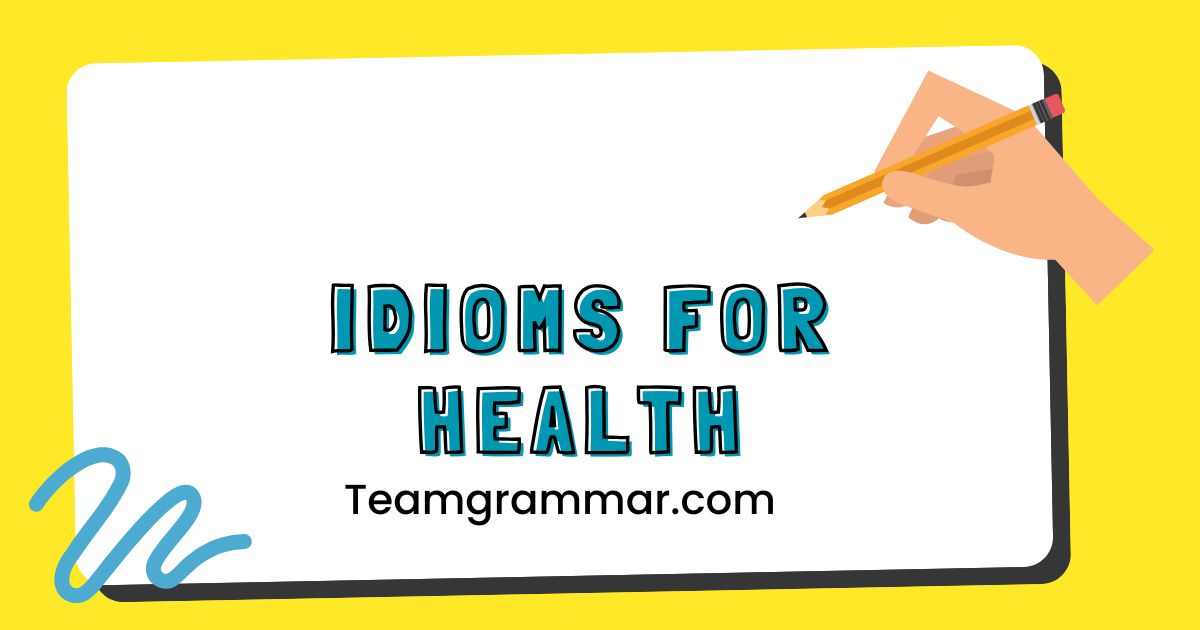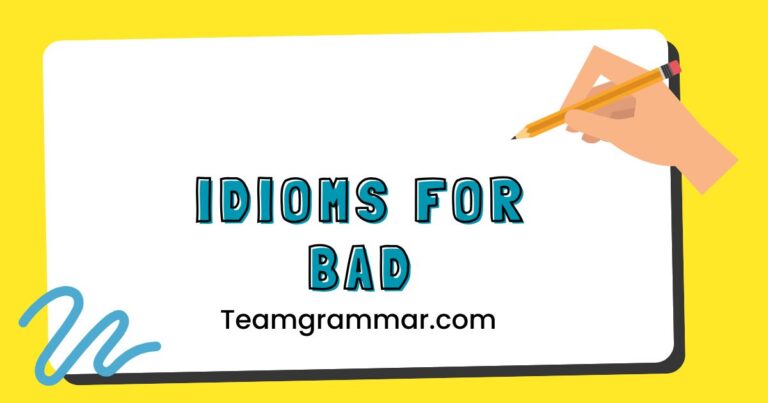47 Health Idioms: Mastering English Expressions
Understanding idioms is crucial for mastering English, as they add color and depth to communication. Health idioms, in particular, are frequently used in everyday conversations, literature, and media.
This article provides a comprehensive guide to health-related idioms, exploring their meanings, origins, and usage. Whether you are an ESL student, a language enthusiast, or simply looking to improve your English proficiency, this guide will equip you with the knowledge and skills to confidently use and understand health idioms.
Table of Contents
- Introduction
- Definition of Health Idioms
- Structural Breakdown
- Types and Categories of Health Idioms
- Examples of Health Idioms
- Usage Rules for Health Idioms
- Common Mistakes When Using Health Idioms
- Practice Exercises
- Advanced Topics in Health Idioms
- Frequently Asked Questions
- Conclusion
Introduction
Idioms are an integral part of the English language, enriching conversations and adding layers of meaning beyond literal interpretations. Health idioms, specifically, are frequently used to describe physical and mental well-being, illnesses, treatments, and overall lifestyle.
Mastering these idioms can significantly enhance your comprehension and fluency in English. This article serves as a comprehensive guide, offering explanations, examples, and practical exercises to help you confidently navigate the world of health-related idiomatic expressions.
This guide is designed for English language learners of all levels, from beginners seeking to expand their vocabulary to advanced speakers aiming to refine their understanding of nuanced expressions. By exploring the structure, types, and usage of health idioms, you will gain a deeper appreciation for the richness and complexity of the English language.
Let’s embark on this journey to unlock the secrets of health idioms and elevate your English skills.
Definition of Health Idioms
An idiom is a phrase or expression whose meaning cannot be understood from the ordinary meanings of the words within it. It’s a figurative way of speaking where the overall meaning is different from the literal meaning of the individual words.
Health idioms specifically relate to concepts of physical and mental well-being, illnesses, treatments, and health-related habits. They are often used to convey emotions, attitudes, or experiences in a vivid and concise manner.
Health idioms can be classified based on their function and context. For instance, some idioms describe states of health (e.g.,feeling under the weather), while others refer to treatments or recovery processes (e.g.,on the mend).
Understanding the context in which these idioms are used is crucial for accurate interpretation. Furthermore, health idioms often reflect cultural attitudes and beliefs about health and wellness.
Recognizing these cultural nuances can further enhance your understanding and appreciation of these expressions.
Structural Breakdown
The structure of health idioms can vary significantly. Some idioms are simple phrases consisting of a few words, while others are more complex sentences.
The grammatical structure of an idiom often doesn’t follow standard grammatical rules, which is why idioms can be challenging for language learners. Understanding the structural components of idioms can aid in their comprehension and usage.
Many health idioms contain verbs, nouns, adjectives, and prepositions, often combined in unique and non-literal ways. For example, the idiom “kick the bucket” uses a verb (kick) and a noun (bucket) to refer to death, a meaning unrelated to the literal definitions of the words.
Similarly, “hale and hearty” uses two adjectives to describe someone in good health. Analyzing the structural elements of an idiom can provide clues to its underlying meaning and origin.
Let’s delve into some common structural patterns found in health idioms:
- Verb + Noun: Catch a cold, fight a bug
- Adjective + Noun: Clean bill of health, sound mind
- Prepositional Phrase: Under the weather, on the mend
- Phrasal Verb: Come down with, shake off
Types and Categories of Health Idioms
Health idioms can be categorized based on various aspects of health they represent. This categorization helps in understanding the specific contexts in which these idioms are used.
Here are some common categories:
General Health
These idioms describe overall well-being and physical condition. They often convey a sense of vitality, fitness, or general health status.
Illness and Injury
This category includes idioms that describe different types of illnesses, injuries, and symptoms. They often express the severity or nature of a health problem.
Recovery and Treatment
These idioms relate to the process of healing, getting better, and receiving medical care. They often convey hope, progress, or the effectiveness of treatment.
Mental Health
This category focuses on idioms that describe mental and emotional well-being, stress, and psychological conditions. They often express feelings, attitudes, or mental states.
Lifestyle and Habits
These idioms pertain to health-related behaviors, such as diet, exercise, and habits that affect overall health. They often convey the importance of healthy choices or the consequences of unhealthy ones.
Examples of Health Idioms
The following tables provide extensive examples of health idioms, organized by category. Each example includes the idiom, its meaning, and a sample sentence to illustrate its usage.
General Health Idioms
This table lists idioms related to general health and well-being. Understanding these idioms can help you describe someone’s overall physical condition and vitality.
| Idiom | Meaning | Example Sentence |
|---|---|---|
| In the pink | In good health | After a week of rest, she’s finally in the pink again. |
| Fit as a fiddle | In excellent physical condition | My grandfather is 90 years old, but he’s still fit as a fiddle. |
| Hale and hearty | Healthy and strong | Despite his age, he remains hale and hearty. |
| Full of beans | Energetic and lively | The children were full of beans after their nap. |
| Right as rain | Perfectly healthy or fine | After a good night’s sleep, I felt right as rain. |
| Clean bill of health | Official confirmation of good health | The doctor gave him a clean bill of health after the check-up. |
| Alive and kicking | Still alive and well, active | Despite the rumors, she is alive and kicking and working on a new project. |
| On top of the world | Feeling extremely happy and healthy | She felt on top of the world after winning the marathon. |
| A picture of health | Looking very healthy | With her glowing skin and bright eyes, she was a picture of health. |
| As sound as a bell | In perfect condition | The old car is as sound as a bell, despite its age. |
| To have a spring in one’s step | To walk energetically and happily | Ever since he started exercising, he has a spring in his step. |
| To be as right as rain | To be perfectly well or correct | After taking the medicine, he was as right as rain. |
| In fine fettle | In good condition; healthy | The team is in fine fettle and ready for the championship. |
| To keep in shape | To maintain good physical condition | He goes to the gym regularly to keep in shape. |
| To be bursting with health | To be very healthy and full of energy | After the vacation, she was bursting with health. |
| To be as healthy as a horse | To be very strong and healthy | Despite working long hours, he is as healthy as a horse. |
| To feel on song | To feel healthy and energetic | After a good night’s sleep, I felt on song and ready for the day. |
| To have a new lease on life | To feel rejuvenated and full of energy after a difficult period | After surviving the illness, he felt like he had a new lease on life. |
| To be in good nick | To be in good condition (British English) | The car is still in good nick despite being quite old. |
| To be on the mend | To be recovering from an illness or injury | After a week in the hospital, she is finally on the mend. |
Illness and Injury Idioms
This table focuses on idioms that describe various illnesses and injuries. Understanding these idioms can help you discuss health problems and symptoms in a more expressive way.
| Idiom | Meaning | Example Sentence |
|---|---|---|
| Under the weather | Feeling unwell | I’m feeling a bit under the weather today, so I’m staying home. |
| Aches and pains | Minor physical discomforts | As you get older, you start to get more aches and pains. |
| Run-down | Tired and in poor health | She’s been feeling run-down lately due to stress. |
| Come down with | To become ill with a specific disease | He came down with the flu after the trip. |
| Bite the dust | To die (often used humorously) | The old computer finally bit the dust after ten years. |
| Kick the bucket | To die (informal) | He was afraid he’d kick the bucket before seeing his grandchildren grow up. |
| At death’s door | Very close to dying | After the accident, he was at death’s door, but he pulled through. |
| Black and blue | Covered in bruises | He was black and blue after falling down the stairs. |
| To feel out of sorts | To feel slightly unwell or unhappy | I’ve been feeling out of sorts all day. |
| To be on one’s last legs | To be near the end of one’s life or in very poor condition | The old car is on its last legs. |
| To be as white as a sheet | To look very pale, usually because of illness or shock | She turned as white as a sheet when she heard the news. |
| To be green around the gills | To look unwell or nauseous | He looked green around the gills after the roller coaster ride. |
| To be off color | To be slightly unwell | She’s been a bit off color lately. |
| To be under the weather | To feel ill | I’m feeling a bit under the weather today. |
| To be down with something | To be ill with something | He is down with a bad cold. |
| A splitting headache | A very severe headache | I have a splitting headache from staring at the computer screen all day. |
| To be laid up | To be confined to bed because of illness or injury | She was laid up with the flu for a week. |
| To catch one’s death of cold | To become very ill with a cold (often used humorously) | If you go out in that weather without a coat, you’ll catch your death of cold. |
| To have a frog in one’s throat | To have difficulty speaking because of a throat irritation | I have a frog in my throat; excuse my raspy voice. |
| To be at death’s door | To be very ill and close to dying | After the surgery, he was at death’s door. |
| To feel like death warmed up | To feel very ill and weak | I feel like death warmed up this morning. |
Recovery and Treatment Idioms
This table provides idioms related to recovery and treatment processes. Knowing these expressions can help you discuss healing, medical care, and getting better.
| Idiom | Meaning | Example Sentence |
|---|---|---|
| On the mend | Recovering from an illness or injury | After a week in the hospital, she’s finally on the mend. |
| Back on your feet | Recovered from an illness or difficulty | It took a few weeks, but he’s finally back on his feet. |
| Pull through | To recover from a serious illness or injury | The doctors weren’t sure if he would pull through, but he did. |
| Get over it | To recover from an illness or emotional upset | It took her a while to get over the flu. |
| Shake off | To get rid of an illness | He’s trying to shake off his cold before the big game. |
| Take one’s medicine | To accept an unpleasant consequence | He had to take his medicine when he failed the exam. |
| A shot in the arm | Something that gives encouragement or energy | The new contract was a shot in the arm for the company. |
| To nurse someone back to health | To care for someone until they recover | She nursed her husband back to health after his surgery. |
| To be given a clean bill of health | To be declared healthy by a doctor | After the check-up, he was given a clean bill of health. |
| To take it easy | To rest and avoid exertion | The doctor told him to take it easy for a few weeks. |
| To rest and recuperate | To rest in order to recover from illness or exertion | After the marathon, she needed to rest and recuperate. |
| To bounce back | To recover quickly from a setback or illness | She always bounces back quickly from any illness. |
| To convalesce at home | To recover one’s health and strength gradually at home | After being discharged from the hospital, he will convalesce at home. |
| To be discharged from the hospital | To be officially allowed to leave the hospital | He was happy to be discharged from the hospital after a week. |
| To follow doctor’s orders | To do what a doctor has advised | It is important to follow doctor’s orders to recover quickly. |
| To feel better by leaps and bounds | To improve in health very quickly | She is feeling better by leaps and bounds since starting the new medication. |
| To turn the corner | To pass the critical stage of an illness and begin to improve | He has turned the corner and is now expected to make a full recovery. |
| To be on the road to recovery | To be in the process of recovering from an illness or injury | She is on the road to recovery after her surgery. |
| To be as good as new | To be fully recovered and in excellent condition | After the repairs, the car is as good as new. |
| To mend well | To recover well from an injury or illness | The doctor said the broken bone is mending well. |
| To be patched up | To be repaired or healed after injury | After the accident, he was patched up at the hospital. |
Mental Health Idioms
This table includes idioms related to mental and emotional well-being. Understanding these idioms can help you express feelings, attitudes, and mental states in a nuanced way.
| Idiom | Meaning | Example Sentence |
|---|---|---|
| Sound mind | Healthy mental state | It’s important to maintain a sound mind in a sound body. |
| Stress someone out | To cause someone to feel stressed | The upcoming deadline is really stressing me out. |
| Driven to distraction | Extremely annoyed or frustrated | The constant noise was driving me to distraction. |
| On edge | Nervous and tense | She’s been on edge ever since the accident. |
| Lose one’s mind | To become insane or irrational | He almost lost his mind when he couldn’t find his keys. |
| Beside oneself | Extremely worried or upset | She was beside herself with grief after the loss. |
| At the end of one’s rope | Having no strength or patience left | After weeks of sleepless nights, I was at the end of my rope. |
| A nervous wreck | A person who is very anxious or nervous | She was a nervous wreck before the presentation. |
| To be down in the dumps | To be unhappy or depressed | She’s been down in the dumps since she lost her job. |
| To have a mind of one’s own | To have independent thoughts and opinions | She is a strong-willed woman who has a mind of her own. |
| To be in two minds about something | To be undecided about something | I’m in two minds about whether to go to the party. |
| To take one’s mind off something | To stop thinking about something troubling | I went for a walk to take my mind off the problem. |
| To be out of one’s mind | To be behaving irrationally or crazily | He must be out of his mind to do something so dangerous. |
| To keep a level head | To remain calm and rational in a difficult situation | It’s important to keep a level head in an emergency. |
| To have a short fuse | To become angry easily | He has a short fuse, so be careful what you say. |
| To be tearing one’s hair out | To be very anxious and frustrated | The project deadline is making everyone tear their hair out. |
| To be on cloud nine | To be extremely happy | She was on cloud nine after getting the job offer. |
| To have a weight lifted off one’s shoulders | To feel relieved of a burden or worry | It was like a weight lifted off my shoulders when I finished the exam. |
| To be at peace with oneself | To feel content and calm | After years of searching, he finally felt at peace with himself. |
| To be stressed out | To be feeling overwhelmed with stress | She is stressed out because of the upcoming exams. |
| To be losing it | To be losing control of one’s emotions | He started losing it when he heard the bad news. |
Lifestyle and Habits Idioms
This table presents idioms related to lifestyle and health-related habits. Understanding these expressions can help you discuss healthy choices and their impact on overall well-being.
| Idiom | Meaning | Example Sentence |
|---|---|---|
| A couch potato | A person who spends a lot of time sitting and watching television | He’s such a couch potato; he never exercises. |
| Work up a sweat | To exercise vigorously | He worked up a sweat at the gym this morning. |
| Live fast, die young | To live a reckless and dangerous life | He lived by the motto “live fast, die young.” |
| Everything in moderation | Not doing too much of anything | He believes in everything in moderation, including chocolate. |
| A sweet tooth | A strong liking for sweet foods | She has a sweet tooth and loves desserts. |
| Bite off more than one can chew | To take on more than one can handle | He bit off more than he could chew when he volunteered for three projects. |
| Burn the candle at both ends | To work very hard and late into the night | She’s been burning the candle at both ends trying to finish the project. |
| To be a health nut | To be very interested in and concerned about one’s health | She is a health nut and only eats organic food. |
| To go cold turkey | To stop an addictive behavior abruptly | He decided to go cold turkey and quit smoking. |
| To have a balanced diet | To eat a variety of healthy foods | It’s important to have a balanced diet for good health. |
| To kick a habit | To stop a bad habit | He is trying to kick the habit of biting his nails. |
| To watch one’s weight | To be careful about what one eats to avoid gaining weight | She is watching her weight and avoiding sugary foods. |
| To cut down on something | To reduce the amount of something | He is trying to cut down on coffee. |
| To pig out | To eat a large amount of food | They pigged out on pizza and ice cream. |
| To live from hand to mouth | To live on very little money | They are living from hand to mouth since he lost his job. |
| To be a heavy smoker | To smoke a lot | He is a heavy smoker and needs to quit. |
| To wet one’s whistle | To have a drink | Let’s stop for a moment to wet our whistles. |
| To work up an appetite | To become hungry through physical activity | The hike helped us work up an appetite. |
| To have a second helping | To have a second serving of food | He decided to have a second helping of the delicious pie. |
| To be on a health kick | To be very focused on improving one’s health | She is on a health kick and exercising every day. |
| To take a break | To stop working for a short time to relax | It’s important to take a break from studying every hour. |
Usage Rules for Health Idioms
Using health idioms correctly requires understanding their specific meanings and contexts. Here are some key rules to follow:
- Context is crucial: Always consider the context in which the idiom is used. The same idiom can have different meanings in different situations.
- Literal vs. Figurative: Remember that idioms have a figurative meaning that differs from the literal meaning of the words.
- Cultural Sensitivity: Be aware of cultural differences in idiom usage. Some idioms may be more common or appropriate in certain cultures than others.
- Formality: Consider the level of formality of the situation. Some idioms are more appropriate for informal conversations, while others are suitable for formal settings.
- Audience: Tailor your language to your audience. Avoid using idioms that your audience may not understand.
It’s also important to note that some idioms have variations in wording. While these variations are often acceptable, it’s best to stick to the most common and widely recognized form of the idiom to avoid confusion.
Furthermore, pay attention to the grammatical structure of the idiom. Altering the structure can change the meaning or make the idiom sound incorrect.
For instance, saying “under weather” instead of “under the weather” is grammatically incorrect and changes the meaning.
Common Mistakes When Using Health Idioms
One of the most common mistakes is interpreting idioms literally. Remember that idioms have a figurative meaning that is different from the literal meaning of the words.
Another common mistake is using the wrong form of an idiom. For example, saying “feeling under weather” instead of “feeling under the weather.” It is also common to misuse idioms in the wrong context.
For instance, using an informal idiom in a formal setting can be inappropriate. Here are some examples of common mistakes:
| Incorrect | Correct | Explanation |
|---|---|---|
| I’m feeling below the weather. | I’m feeling under the weather. | The correct idiom is “under the weather,” not “below the weather.” |
| He is on the mendings. | He is on the mend. | The idiom is “on the mend,” not “on the mendings.” |
| She gave him a clean health of bill. | She gave him a clean bill of health. | The correct order of words is “clean bill of health.” |
| They are full of potatoes. | They are full of beans. | The idiom is “full of beans,” which means energetic, not “full of potatoes.” |
| He kicked the container. | He kicked the bucket. | “Kicked the bucket” is an idiom for dying, not “kicked the container.” |
Practice Exercises
Test your understanding of health idioms with these practice exercises. Choose the correct idiom to complete each sentence.
Exercise 1: Fill in the Blanks
Complete the following sentences with the correct health idiom from the list provided.
- After a week of rest, she’s finally __________. (a. on the mend, b. under the weather, c. full of beans)
- My grandfather is 90 years old, but he’s still __________. (a. fit as a fiddle, b. a couch potato, c. at death’s door)
- The children were __________ after their nap. (a. under the weather, b. full of beans, c. on the mend)
- He __________ after the trip. (a. came down with, b. pulled through, c. shook off) the flu
- After the accident, he was __________, but he recovered. (a. on the mend, b. at death’s door, c. right as rain)
- The doctor told him to __________ for a few weeks. (a. bite the dust, b. take it easy, c. burn the candle)
- She’s been __________ since she lost her job. (a. on cloud nine, b. down in the dumps, c. full of beans)
- He decided to __________ and quit smoking. (a. go cold turkey, b. work up a sweat, c. pig out)
- She __________ when she volunteered for three projects. (a. watched her weight, b. bit off more than she could chew, c. cut down on something)
- He __________ at the gym this morning. (a. took a break, b. worked up a sweat, c. lived from hand to mouth)
Answers:
- a. on the mend
- a. fit as a fiddle
- b. full of beans
- a. came down with
- b. at death’s door
- b. take it easy
- b. down in the dumps
- a. go cold turkey
- b. bit off more than she could chew
- b. worked up a sweat
Exercise 2: Matching
Match the idiom with its correct meaning.
| Idiom | Meaning |
|---|---|
| 1. Under the weather | a. To recover from an illness or injury |
| 2. On the mend | b. To feel unwell |
| 3. Fit as a fiddle | c. To be very anxious or nervous |
| 4. A nervous wreck | d. In excellent physical condition |
| 5. Take it easy | e. To rest and avoid exertion |
Answers:
- 1-b
- 2-a
- 3-d
- 4-c
- 5-e
Exercise 3: True or False
Determine whether the following statements about health idioms are true or false.
- “To kick the bucket” means to die. (True / False)
- “To be full of beans” means to be tired and sluggish. (True / False)
- “To be on cloud nine” means to be extremely happy. (True / False)
- “To be under the weather” means to be in excellent health. (True / False)
- “To burn the candle at both ends” means to relax and take it easy. (True / False)
- ”
To go cold turkey” means to gradually reduce an addiction. (True / False)
Answers:
- True
- False
- True
- False
- False
- False
Advanced Topics in Health Idioms
For advanced learners, exploring the etymology and cultural context of health idioms can provide a deeper understanding of their meanings and usage. Many idioms have historical roots, reflecting past beliefs and practices related to health and medicine.
For example, the idiom “kick the bucket” is believed to originate from the practice of hanging slaughtered animals from a bucket, which they would kick as they died. Understanding these origins can add layers of meaning to the idioms and make them more memorable.
Furthermore, idioms can vary significantly across different English-speaking regions. An idiom that is common in British English may be unfamiliar or have a different meaning in American English.
Being aware of these regional variations can help you communicate more effectively with people from different cultural backgrounds. Additionally, exploring the use of health idioms in literature and media can provide valuable insights into their stylistic and expressive potential.
Authors and speakers often use idioms to add color, humor, or emphasis to their language, making their message more engaging and memorable.
Frequently Asked Questions
Conclusion
Mastering health idioms is an essential step in achieving fluency and proficiency in English. By understanding the meanings, origins, and usage of these expressions, you can communicate more effectively and confidently in a variety of contexts.
This guide has provided you with a comprehensive overview of health idioms, including examples, practice exercises, and tips for avoiding common mistakes. Continue to explore and practice using these idioms to enhance your English skills and deepen your appreciation for the richness and complexity of the language.
Embrace the challenge of learning idioms, and you will find your communication skills greatly enhanced. Keep practicing, and soon you’ll be using health idioms like a native speaker!







